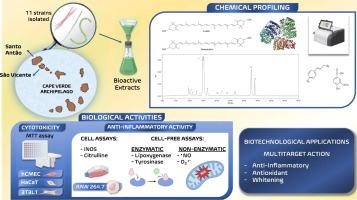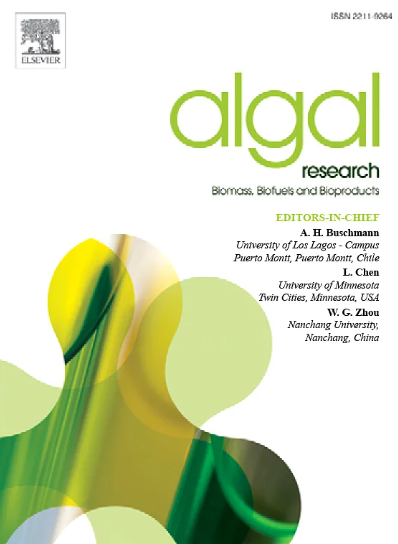蓝藻中的类胡萝卜素能调节 iNOS 并抑制炎症介质的产生:有望用于治疗炎症的药物
IF 4.6
2区 生物学
Q1 BIOTECHNOLOGY & APPLIED MICROBIOLOGY
Algal Research-Biomass Biofuels and Bioproducts
Pub Date : 2024-10-01
DOI:10.1016/j.algal.2024.103729
引用次数: 0
摘要
蓝藻是一种绿色的多产品精炼厂,其不同的工业前景越来越受到关注。在这项工作中,研究人员探索了从佛得角群岛分离出来的 11 种蓝藻菌株在炎症领域的生物技术应用。研究人员采用生物炼制方法生产类胡萝卜素靶向提取物,并通过 HPLC-PDA 对提取物进行进一步分析,探索其在以下方面的能力:i)清除参与炎症过程的重要生理自由基氧自由基(超氧阴离子自由基,O2--)和氮自由基(一氧化氮,-NO);ii)减缓炎症后色素沉着;iii)在由 RAW 264.7 细胞组成的酶和细胞系统中调节炎症细胞因子产生酶的活性。所研究的菌株是重要的类胡萝卜素生产者(70.47-186.71 微克毫克-1 干提取物),主要是β-胡萝卜素和玉米黄质。靶向提取物具有通过多靶点方法减缓炎症过程的潜力:清除氧化亚氮和氧气,通过抑制脂氧合酶减少炎症细胞因子的产生,以及调节 LPS 刺激的 RAW 264.7 细胞中的诱导型一氧化氮合酶。本文章由计算机程序翻译,如有差异,请以英文原文为准。

Carotenoids from cyanobacteria modulate iNOS and inhibit the production of inflammatory mediators: Promising agents for the treatment of inflammatory conditions
Cyanobacteria are green multiproduct refineries of increasing interest for different industrial prospects. In this work, eleven cyanobacteria strains isolated from the Cape Verde archipelago were explored for their biotechnological applications in the field of inflammation. A biorefinery approach was employed to produce carotenoid-targeted extracts, further profiled by HPLC-PDA and explored for their ability to i) scavenge important physiological free radicals of oxygen (superoxide anion radical, O2•-) and nitrogen (nitric oxide, •NO) involved in the inflammatory process ii) slow-down post-inflammatory hyperpigmentation and iii) modulate the activity of inflammatory cytokine-producing enzymes, in enzymatic and cell systems comprising RAW 264.7 cells. The studied strains turned out to be important carotenoid producers (70.47–186.71 μg mg−1dry extract), mainly represented by β-carotene and zeaxanthin. The targeted-extracts stood-out for their potential to slow-down the inflammatory process through a multitarget approach: scavenging •NO and O2•-, reducing inflammatory cytokines production through lipoxygenase inhibition, and modulating the inducible nitric oxide synthase in LPS-stimulated RAW 264.7 cells, with strains of the order Nodosilineales revealing to be worth of further biotechnological exploitation.
求助全文
通过发布文献求助,成功后即可免费获取论文全文。
去求助
来源期刊

Algal Research-Biomass Biofuels and Bioproducts
BIOTECHNOLOGY & APPLIED MICROBIOLOGY-
CiteScore
9.40
自引率
7.80%
发文量
332
期刊介绍:
Algal Research is an international phycology journal covering all areas of emerging technologies in algae biology, biomass production, cultivation, harvesting, extraction, bioproducts, biorefinery, engineering, and econometrics. Algae is defined to include cyanobacteria, microalgae, and protists and symbionts of interest in biotechnology. The journal publishes original research and reviews for the following scope: algal biology, including but not exclusive to: phylogeny, biodiversity, molecular traits, metabolic regulation, and genetic engineering, algal cultivation, e.g. phototrophic systems, heterotrophic systems, and mixotrophic systems, algal harvesting and extraction systems, biotechnology to convert algal biomass and components into biofuels and bioproducts, e.g., nutraceuticals, pharmaceuticals, animal feed, plastics, etc. algal products and their economic assessment
 求助内容:
求助内容: 应助结果提醒方式:
应助结果提醒方式:


